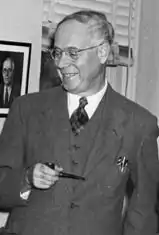Karl Lark-Horovitz
Karl Lark-Horovitz (July 20, 1892 – April 14, 1958) was an American physicist known for his pioneering work in solid-state physics that played a role in the invention of the transistor. He brought the previously neglected physics department at Purdue University to prominence during his tenure there as department head from 1929 until his death in 1958.
Karl Lark-Horovitz | |
|---|---|
 1947 at the AAAS | |
| Born | July 20, 1892 |
| Died | April 14, 1958 (aged 65) |
| Alma mater | University of Vienna |
| Scientific career | |
| Fields | Physics |
| Institutions | Purdue University |
| Doctoral students | Hellmut Fritzsche |
Early years
Born Karl Horovitz in Vienna, Austria, on July 20, 1892, he was encouraged by both his father, Moritz, (dermatologist) and mother, Adele (Hofmann), to pursue varied scholarly interests. Horovitz choose to attend Humanistic School for secondary education.[1]
References
- "Karl Lark-Horovitz: Department of Physics and Astronomy: Purdue University". www.physics.purdue.edu. Retrieved 2022-06-01.
This article is issued from Wikipedia. The text is licensed under Creative Commons - Attribution - Sharealike. Additional terms may apply for the media files.